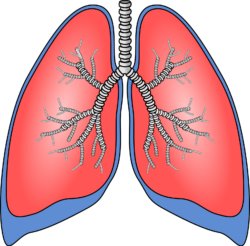Causes of Kidney Cancer That Could Lower Your AFFF Case Value
We've identified several factors that could lower the value of your AFFF case related to kidney cancer. Exposing predispositions, like genetic conditions or a family history of kidney cancer, greatly impacts case evaluation. Lifestyle choices, such as smoking or obesity, may also affect the claim's potential value. Additionally, occupational hazards beyond AFFF exposure, including workplace carcinogens, and pre-existing kidney conditions or diseases, could complicate the case. Finally, environmental contaminants and the limitations of protective gear exposing firefighters to PFAS heighten risk and legal complexities. Understanding these nuances is vital for maneuvering your claim, revealing deeper insights into the legal process.
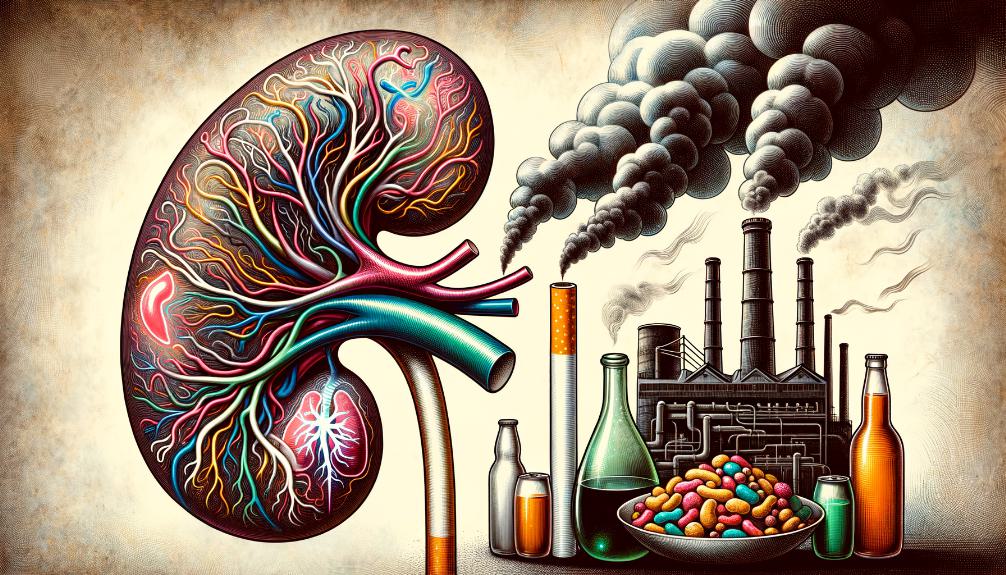
Key Takeaways
- Smoking, obesity, and poor diet can be lifestyle factors reducing AFFF case value.
- Pre-existing kidney conditions may complicate case evaluations, impacting claim amount.
- Genetic predispositions, like VHL gene mutations, could lower the perceived impact of AFFF.
- Alcohol consumption and other chemical exposures outside AFFF can affect case valuation.
- Family history of kidney cancer may influence compensation by highlighting genetic factors.
PFAS Exposure Risks
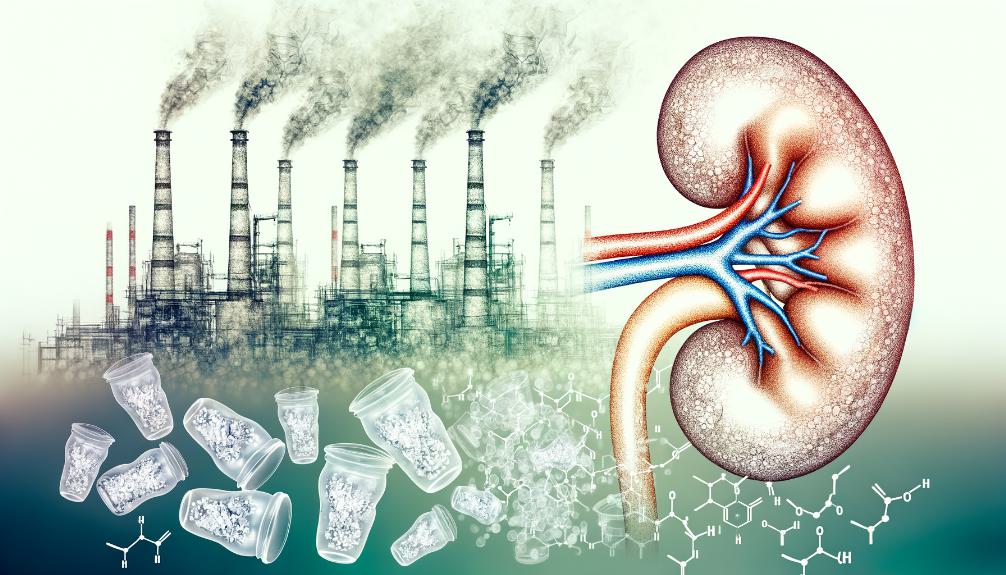
Among the myriad risks firefighters face, exposure to PFAS through AFFF greatly heightens our chances of developing kidney cancer. These toxic chemicals, specifically PFOA and PFOS, are found extensively in firefighting foams, especially those used on military bases, putting us at a significant risk. The link between PFAS exposure and kidney cancer is alarmingly strong, with studies showing that elevated levels of PFAS in our blood can more than double our risk of this life-threatening disease.
We've learned that long-term exposure to these substances is particularly hazardous. The chemicals in AFFF, designed to suppress fire efficiently, are now known to have a dark side, contributing to a heightened incidence of kidney cancer among us firefighters. This risk is not just theoretical; it manifests within 15 years of exposure due to the toxicity of PFAS. Given the latency period, many of us are diagnosed at a stage where options might be limited, highlighting the importance of understanding and mitigating these risks as much as possible.
It's imperative for us to acknowledge the gravity of this situation. The knowledge that our profession exposes us to such high levels of toxic chemicals, thereby increasing our chances of developing serious health conditions like kidney cancer, is concerning. This isn't just about our individual health; it's a systemic issue that calls for immediate action to protect current and future firefighters from the devastating consequences of PFAS exposure through AFFF.
Genetic Predispositions
While the previous discussion emphasized the dangers of PFAS exposure, we mustn't overlook genetic predispositions that can greatly magnify our risk of developing kidney cancer. It's important to understand that conditions like von Hippel-Lindau disease or hereditary papillary renal cell carcinoma greatly increase this risk. These are not just medical terms but stark realities for some individuals who carry inherited genetic mutations predisposing them to kidney cancer. Indeed, 2-5% of kidney cancer cases stem from such genetic factors.
Specific mutations, especially in the VHL gene, are particularly infamous for raising the likelihood of kidney cancer. This information isn't just important for medical diagnosis and treatment; it plays a significant role in evaluating the overall case value in AFFF exposure claims. Why? Because individuals with a family history of kidney cancer are at a higher risk, implying that genetic predispositions can influence the severity and susceptibility to diseases caused by external factors like PFAS.
As we navigate the complexities of AFFF exposure and its link to kidney cancer, we're reminded of the importance of considering genetic factors. These inherited genetic mutations, while a small percentage of overall kidney cancer cases, underscore the multifaceted nature of the disease and its risk factors. Understanding these predispositions is not only crucial for personal health but also for accurately determining case value in legal claims related to AFFF exposure. It's a reminder that behind every statistic, there's a personal story intertwined with both genetic and environmental threads.
Lifestyle Factors
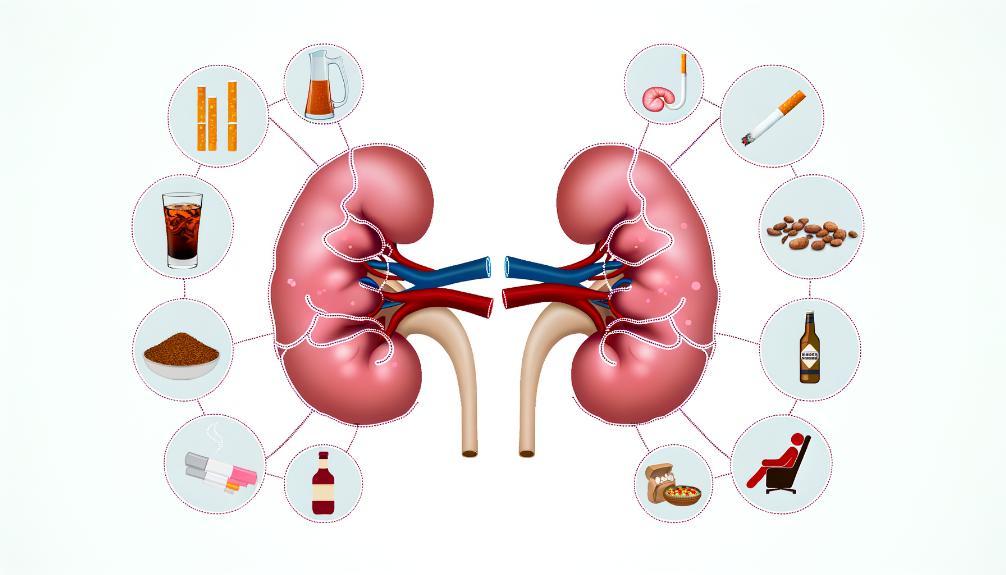
Lifestyle choices, including smoking and poor diet, can greatly diminish the value of your AFFF kidney cancer claim. We acknowledge that underlying health factors, such as obesity and sedentary lifestyle habits, play a substantial role in the development of many diseases, including kidney cancer. These elements are pivotal when evaluating the compensation for AFFF exposure cases.
Smoking, a well-documented risk factor for numerous health conditions, is especially important in kidney cancer claims. It's not only about the immediate health risks but also how it can lower the potential value of your case. Similarly, obesity and poor diet choices are seen as controllable risk factors. These lifestyle decisions may lead the defense to argue that personal health choices, rather than AFFF exposure, contributed significantly to the development of kidney cancer.
Furthermore, physical inactivity and a sedentary lifestyle can further complicate the case. While it's challenging to quantify the exact impact, these factors are often taken into account when evaluating the overall health condition and potential contributory causes of the illness.
Alcohol consumption and exposure to harmful chemicals outside of AFFF also factor into the evaluation of your case. It's crucial to understand that these lifestyle choices can influence the evaluation process, potentially reducing the compensation value.
Lastly, failure to follow proper medical advice or treatments for kidney cancer can severely diminish the potential value of your AFFF exposure claim. It's important to adhere to medical recommendations to not only improve your health outcome but also to maintain the integrity and value of your legal claim.
Occupational Hazards
We're now turning our attention to the occupational hazards firefighters face, particularly with AFFF exposure. It's evident that chemical exposure risks and the limitations of protective gear have a substantial impact on the assessment of kidney cancer cases. Understanding these factors is vital in evaluating the compensation firefighters deserve for their increased health risks.
Chemical Exposure Risks
Occupational exposure to harmful chemicals, including PFAS found in AFFF, greatly heightens the risk of developing kidney cancer. We've observed that firefighters, industrial workers, and military personnel, in particular, face significant dangers due to their close contact with toxic chemicals. The continuous exposure to these carcinogens can lead to genetic mutations, ultimately resulting in the formation of kidney tumors. Additionally, the repeated handling of AFFF foam and similar hazardous materials can severely damage kidney cells, fostering cancerous growths. It's vital for workers in these high-risk industries to implement workplace precautions to minimize their exposure. Taking such steps is essential not only for their health but also for reducing the risk of kidney cancer linked to occupational exposure.
Protective Gear Limitations
Despite advancements in safety equipment, protective gear often falls short in fully shielding firefighters from PFAS exposure, elevating their risk of developing kidney cancer. The protective gear limitations mean that even when fully suited, firefighters can come into skin contact with AFFF, allowing the absorption of toxic PFAS chemicals. This inadequate protection not only poses an occupational hazard but also greatly increases their kidney cancer risk. Inhaling PFAS chemicals, another consequence of these limitations, further compounds the danger, impacting kidney health. The failure to provide effective barriers against PFAS exposure highlights the serious occupational dangers firefighters face in AFFF-related scenarios, underscoring the urgent need for enhanced safety measures.
Medical History Impact
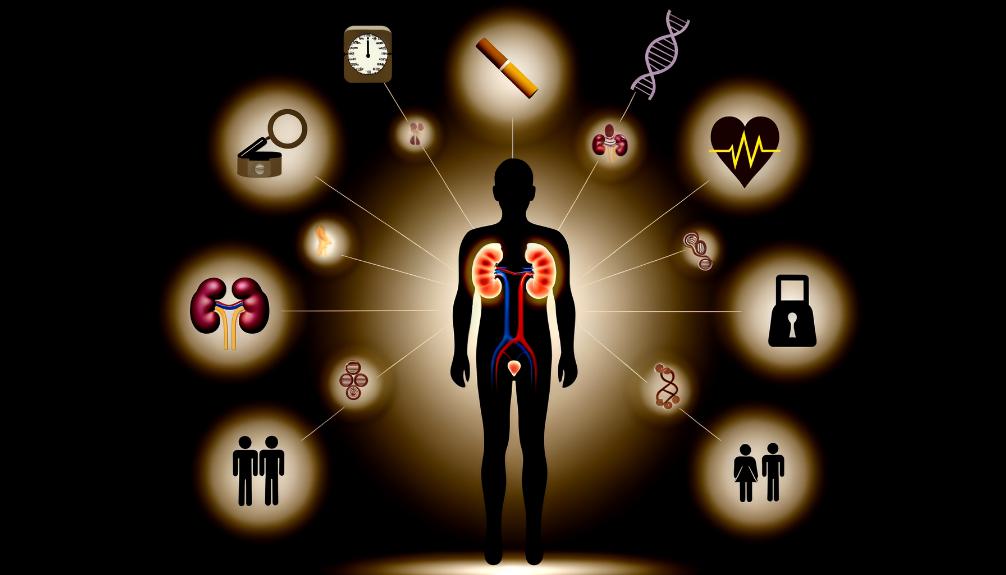
We're now turning our focus to how one's medical history, including pre-existing conditions and family health background, plays a critical role in evaluating AFFF case values. It's important to understand that factors such as prior kidney health issues or familial patterns of kidney cancer can greatly influence the evaluation of AFFF exposure as the primary cause. These elements necessitate a thorough review to accurately determine the impact on each case's value.
Pre-existing Conditions
How do pre-existing conditions like hypertension, obesity, and diabetes influence the value of an AFFF case involving kidney cancer? When we're dealing with AFFF exposure claims, individuals with prior kidney diseases or conditions face a tougher battle. These pre-existing conditions can greatly complicate how damages and compensation are assessed. For example, if someone already has a history of kidney surgeries or treatments, insurance companies might argue that these conditions, rather than AFFF exposure, played a larger role in the development of kidney cancer, potentially reducing the case value. It's important to understand that the presence of these conditions does not automatically disqualify someone from pursuing a claim, but it does make the process more challenging.
Family Health Background
A family history of kidney cancer greatly influences the evaluation of your AFFF exposure claim's value. When we're appraising a case, the presence of a genetic predisposition to kidney cancer due to family health background becomes a critical factor. This isn't just a minor detail; it can have a substantial impact on the compensation amount you might be eligible for. Our legal evaluation meticulously considers your medical history, particularly any instances of kidney cancer within your family. Understanding this aspect of your family's medical history is essential. It's not just about linking AFFF exposure to your condition; it's about how pre-existing genetic factors might alter the evaluation of your claim, potentially affecting the compensation you receive.
Environmental Contaminants
Plunging into the heart of the matter, environmental contaminants, particularly PFAS found in AFFF, are closely connected to an elevated risk of kidney cancer. These toxic chemicals, widespread in certain firefighting foams, have been a significant concern for public health. We're witnessing a concerning trend where exposure to these environmental contaminants is a known factor in the development of kidney cancer. This isn't just a speculative link; the evidence is increasingly clear that AFFF, with its harmful substances like PFAS, can lead to kidney cancer due to environmental exposure.
The connection between PFAS in AFFF and kidney cancer is not just a crucial element in legal cases; it's becoming an essential aspect. As we explore further, we comprehend that these environmental contaminants, particularly PFAS, are associated with a higher incidence of kidney cancer. This fact is fundamental in legal battles where the impact of toxic environmental exposure is being scrutinized. For those involved in AFFF legal cases, the understanding of how these contaminants contribute to the development of kidney cancer is imperative.
It's imperative for us to acknowledge the seriousness of this issue. The risk posed by these toxic chemicals found in the environment, especially those like PFAS from AFFF, cannot be overstated. As legal professionals, recognizing the link between environmental exposure to these contaminants and the development of kidney cancer is crucial in evaluating the value and direction of related legal cases. This knowledge not only informs our legal strategy but also underscores the importance of addressing environmental safety and health concerns.

This post has been generated by AI and was not reviewed by editors. This is Not legal advice. Please consult with an attorney.




